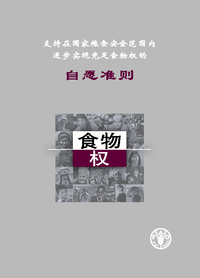Focal point
Location
The Food and Agriculture Organization of the United Nations leads international efforts to defeat hunger. Serving both developed and developing countries, FAO acts as a neutral forum where all nations meet as equals to negotiate agreements and debate policy. FAO is also a source of knowledge and information. We help developing countries and countries in transition modernize and improve agriculture, forestry and fisheries practices and ensure good nutrition for all. Since our founding in 1945, we have focused special attention on developing rural areas, home to 70 percent of the world's poor and hungry people.
Members:
Resources
Displaying 3376 - 3380 of 5074Rural land market in Armenia
Armenia is geographically located in the South Caucasus and bordered by Georgia, Turkey, Azerbaijan and the Islamic Republic of Iran. The total length of its land boundaries is 1,026 km, including a 167-km border with Georgia, 268 km with Turkey, 556 km with Azerbaijan and 35 km with the Islamic Republic of Iran. The total area of Armenia is 29,800 km2, with a land area of 28,400 km2.
Land reform: Land settlement and cooperatives
Although ancestral rights to land are a cornerstone of the livelihoods of indigenous peoples, few countries have been ready to undertake their recognition. Lack of political will together with obstacles such as lack of legal recognition of indigenous rights in national legal frameworks and tenure regimes, different forms of discrimination and inappropriate policies towards indigenous peoples are at the root of some of the limitations that are found with regard to the recognition of indigenous peoples’ land rights.
Land reform: Land settlement and cooperatives
This bulletin is issued by FAO as a medium for the dissemination of information and views on land reform and related subjects to the United Nations, FAO Member Governments and national and international experts and institutions. Articles are published in the original language (English, French or Spanish).
自愿准则 支持在国家粮食安全范围内 逐步实现充足食物权的
The objective of the Voluntary Guidelines is to provide practical guidance to States in their implementation of the progressive realization of the right to adequate food in the context of national food security, in order to achieve the goals of the World Food Summit Plan of Action. They provide an additional instrument to combat hunger and poverty and to accelerate attainment of the Millennium Development Goals.
Report on FAO, UNIFEM and National AIDS Council Joint National Workshop on HIV and AIDS, Women’s Property Rights and Livelihoods in Zimbabwe
Report divided into 5 sections: inheritance and property rights; disability rights, HIV & AIDS, women’s property rights and livelihoods; survival strategies, nutrition, psychosocial support, economic empowerment, and self-reliance; self-reliance and economic empowerment for women in the context of HIV and AIDS; inspiring initiatives from the region (Zambia, Uganda, and Kenya). Contains a number of personal testimonies. Launched the famous T-shirt: ’property and a piece of land give women peace of mind’.









